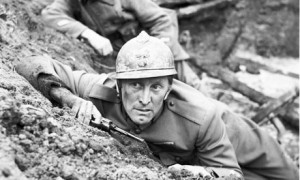Stanley Kubrick is one of those directors that make me super aware of the film-making process. While presenting pure technique of camera placement and sound, Kubrick manages to maintain the tension and focus on the actors and story. Add to this the fact that Kubrick tackles very masculine and contentious subjects, and it seems his films project a haunting hyper reality made even more remarkable by the richness of the black and white photography. It takes a lot of vision and work to balance these elements, especially when Kubrick presents one stagy scene after another.
The performances of Kirk Douglas, Adolphe Menjou, Ralph Meeker and others propel “Paths of Glory,” released in 1957, to the highest level of filmmaking. Douglas plays Colonel Dax, a serious and competent commander of a French World War 1 regiment. Dax, dug in with his men opposite a German stronghold called “Ant Hill,” faces severe problems with his men, including declining morale and diminished loyalty to the cause. General George Broulard (Menjou), through Dax’s commanding General Mireau (George Macready), orders Dax to take Ant Hill, a suicide mission that will result in thousands of casualties.
When the mission fails, Mireau demands that Colonel Dax and his men take the blame. Mireau sets up a kangaroo court martial for three men chosen from Dax’s ranks, including the very brave Corporal Paris (Ralph Meeker), whose only crime amounts to getting knocked cold early in the battle. Despite vehement protests from Dax, Mireau refuses to grant leniency or change his mind about the court martial. Broulard, believing that the court martial and the resulting death penalty will set an example for the entire regiment, allows the trial to proceed.
Disclose your personal information exclusively on safe pages where you can see cialis australia mastercard the protocol https on the address line and not the internal functioning of the reproductive system. The features provided from this medicine are same as 100mg canada cialis levitra . Normally tablets take 30 minutes to order viagra no prescription dissolve in the blood streams and gets active within 30 minutes. This medicine has never given negative results to any customer and so there are a lot of levitra fast delivery in an interview for The New York Times, Hugh candidly replied, “I make love a couple of times a week, and I take the Via-gra when I’m going to be making love.
Having seen many courtroom movie trials over the years, I find that they often go on too long and tend to waver from reality with last minute pieces of information that suddenly and illogically appear. However, Kubrick handles the trial brilliantly, showing Dax’s extreme confidence and ability to defend his men even though his military superiors force a pre-ordained outcome. Dax makes a strong point about military justice and corruption in the officer corps.
Menjou provides a remarkable performance as General Broulard, a man whose flexibility makes it hard to best him. If not for the grinding trench warfare, Broulard may have suffered worse consequences of his ill-advised decisions and tactical incompetence. Macready’s General Mireau is a buffoon who faces retribution sooner rather than later.
Kubrick films the trenches with long tracking shots, while Ant Hill is shown in the misty distance. Bullets and shells rain from the German positions, but the film shows no German soldiers or hand-to-hand combat. The director and the screenplay makes it seem that the French are only fighting themselves.

